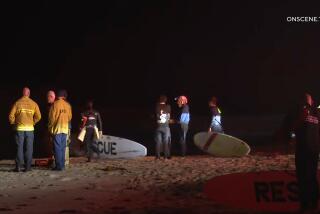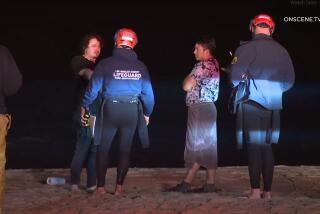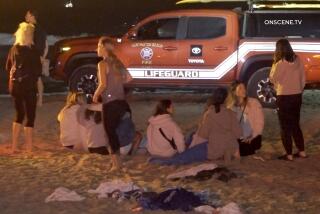Vigil for drowned boy continues
- Share via
LA MISION, MEXICO — When Jerry Colunga saw his 11-year-old son struggling in the water off Mal Paso, he rushed into the surf and started to swim toward him. The boy was 60 or 70 yards out, dog-paddling in surf that had suddenly grown ferocious.
As he fought to reach his son, Colunga saw a fishing boat approach the boy, almost close enough, he thought, to rescue him. But a series of waves crashed into the boat and pitched it into the air. By the time the fishermen had pulled Colunga aboard, his only child -- Paul Maximiliano Gomez -- had disappeared.
In the 17 days since the Aug. 22 drowning, Colunga, a mechanic with the Orange County Fire Authority, has been camped with his wife and other family members on this scenic beach about 35 miles south of Tijuana in hopes of finding Paul’s body.
About 50 lifeguards from Mexico and San Diego County were helping with the search Monday, making their way carefully along the cave-dotted coastline on surfboards and boats, searching through kelp beds and rocks.
“My wife and I are desperate, not being able to do anything but wait and wait,” Colunga told the searchers Monday morning as they gathered on the beach under an overcast sky to begin the day’s efforts. “I ask you to please be safe. We don’t need another tragedy.”
Colunga lives in Santa Ana, though his wife, Raquel Gomez, lived with their son in Tijuana, where Colunga spent four days a week. Paul had just begun sixth grade in Tijuana, an honor student who loved soccer, Legos and Erector sets.
The family camped out Aug. 6 on this flat, sandy white beach, where a campsite costs $20 a day, and enjoyed themselves so much they decided to return Aug. 22. It was a crowded day, and they arrived just before noon.
Along with two cousins, Paul was “champing at the bit to get in the water,” Colunga said. “They were instructed to play only in waist-deep water.”
Colunga’s mother-in-law was watching the boys swim; she sent a girl to the camp to tell him “that there was something wrong in the water.”
Colunga and his brother ran to the water to find that the surf had become fierce. One of Colunga’s nephews was being tossed around on a bodyboard but was saved by his father. The other cousin escaped on his own.
Colunga grabbed a life vest and a rope. He saw his son, who had been sucked out by the surf and separated from his bodyboard, struggling in the waves.
“I swam and swam toward my son,” he said.
Colunga spotted a fishing boat backing toward his son, apparently to rescue him.
“I thought they were going to be able to pull him out. But a huge wave hit the boat and it went straight up in the air and came down hard. Two waves slammed the boat and tossed it around. After that, I didn’t see my son anymore.”
Pulled into the boat, Colunga found that one of the fishermen had suffered a broken nose and rib and a punctured lung. Another fisherman dived into the water with a snorkel to search for the submerged boy. Colunga knew then, he recalled, that his son had drowned. He told the fishermen not to risk their lives.
“I told them, ‘My son is gone; we now need to save this man,’ ” said Colunga, who has first-aid training. “It was one of the toughest calls I’ve ever made. I told them, ‘If we don’t want to lose two people, we have to take care of this man now and get him to an ambulance.’ ”
The injured fisherman’s identity and condition were not available. Family members from Santa Ana and Tijuana are now camped in six tents on the coastline, keeping vigil and praying. In one of the tents is a photo of the boy framed with rosary beads on a table beside a Spanish-language prayer book.
No lifeguards had been on duty at the time of the drowning. Jaime Nieto, director of the Ensenada Fire Department’s rescue squad, said dozens have drowned near this beach over the years because of the unpredictable current.
Nieto’s 14-year-old son drowned near Ensenada, just south of here, and his body was never recovered.
Early Monday afternoon, after hours of fruitless searching, Nick Lerma, a San Diego lifeguard lieutenant, told Colunga that the chances of recovering his son’s body were slim.
“I’m confident that we would have found him if he was there,” Lerma told him, recommending that Colunga pack up and leave the beach with his family.
Colunga said he thought he might stay another week.
“If I leave this beach empty-handed, it’s not going to be because we didn’t try,” he said. “My decisions are all based on emotion and guilt.”
As the searchers returned to the beach Monday, Colunga thanked them for their efforts, and as they walked away, he leaned against an SUV and wept. His wife came over, and they cried in each other’s arms.
Colunga spoke of his son, who he said was bilingual and was so smart that school sometimes bored him.
“I put my son on a high plateau,” he said. “I used to tell him, ‘Paul, you are a special young man.’ I never knew he was so special the Lord was going to take him away from me.”
--
More to Read
Sign up for Essential California
The most important California stories and recommendations in your inbox every morning.
You may occasionally receive promotional content from the Los Angeles Times.











